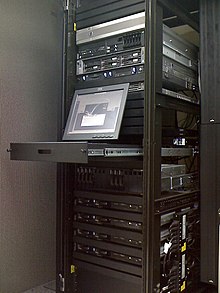Hybrid server
The topic of this article may not meet Wikipedia's notability guidelines for products and services. (January 2013) |

A hybrid hosting service or hybrid server is a type of
Overview
A hybrid server is a new kind of virtual server that offers both the power of a classic
The server is separated into hybrid server environments using Red Hat KVM or any other virtualization. Each hybrid environment is securely isolated and has guaranteed resources available to it which ensures a high level of performance and responsiveness. A hybrid server combines all of the benefits of virtualization technology with the performance of a full dedicated server. So, an administrator can use automation to suspend, restart, or reinstall the operating system. One large server is split into a few (normally two) Hybrid servers. The benefits of this platform also include access through a single point of contact; sharing the network infrastructure; and monitoring, delivering, and managing hosting services.[2]
A specific deployment of a hybrid server involves an

See also
- Dedicated server
- Virtual private server
References
- ISBN 9781466578685.
- ^ a b MarketsandMarkets (7 February 2019). "Recent research: Hybrid Cloud market ongoing trends and recent developments". www.whatech.com. Retrieved 2019-03-07.
- ISBN 9781118282885.
- ISBN 9781119232070.
